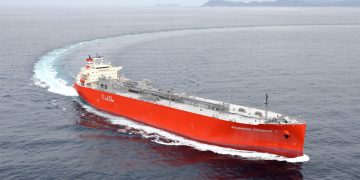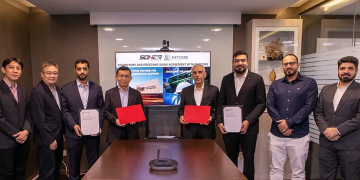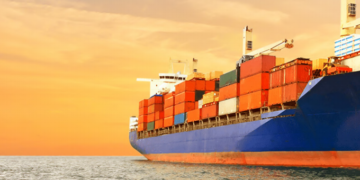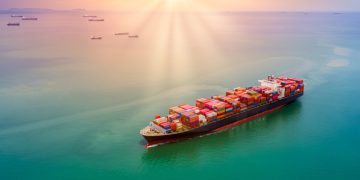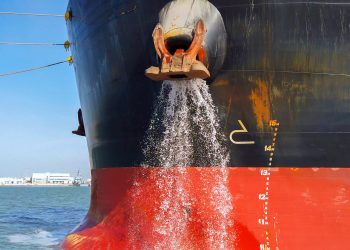The Britannia P&I Club has issued its latest edition of “Risk Watch”, in which includes an article that highlights that Artificial Intelligence (AI) is poised to revolutionise the shipping sector, promising increased efficiency, safety, and environmental sustainability.
According to Jacob Damgaard, Divisional Director, Loss Prevention Singapore, the integration of AI into shipping presents a complex array of benefits and challenges.
What is AI?
AI is a machine’s ability to perform the cognitive functions we associate with human minds, such as perceiving, reasoning, learning, interacting with an environment, problem solving, and even exercising creativity.
AI stands out from traditional computer software due to its capability to learn and adapt to tasks, improving its outputs as it becomes more familiar with them, making it an exceptionally versatile tool. Consequently, the retail and e-commerce industry frequently utilises AI to enhance customer experience. It achieves this by predicting consumers purchasing patterns through the analysis of past buys and internet search history, leading to personalised recommendations.
Where can AI be utilised in the shipping industry?
If you ask about AI’s applications in the shipping industry through one of the freely available chatbots on the internet, you will receive a plethora of suggestions.
This includes:
- Autonomous vessels
- Route optimisation
- Predictive maintenance
- Cargo management
- Supply chain and logistics optimisation
- Safety and security
- Environmental monitoring
- Port operations
- Crew training and assistance
- Communication and navigation systems
- Customs and compliance
- Market analysis
Considering the information above, it is important to acknowledge that AI sees its own role in shipping as highly transformative, offering solutions that range from operational efficiency and safety enhancements to environmental conservation and strategic decision-making. While these aspects are positive, they also highlight the complexity associated with AI. Although it promises and may be capable of a lot, understanding its limitations is essential for successful implementation.
AI usage on ships
Several shipping companies have implemented AI, either on a trial basis or as a more permanent feature to improve safety and efficiency. The Club commonly observes AI trials in areas such as:
BEHAVIOUR BASED SAFETY: Behaviour based safety, also sometimes referred to as vision platforms, uses AI to analyse thousands of hours of footage from on board CCTV. It identifies crucial safety and security events in real time, offering users continuous insight on shipboard activities and behaviours. For instance, it monitors whether the bridge is manned in compliance with regulations and company procedures or if Personal Protective Equipment (PPE) is used correctly. This approach enables shipowners to enhance their understanding and assessment of the safety culture on board, facilitating the sharing of insights and best practice with the crew and fleet.
COLLISION AVOIDANCE: A combination of cameras, thermal imaging, bridge navigation equipment and other installed sensors actively monitors the ship’s surroundings to detect potential hazards. AI processes the data and provides real-time insights and recommendations to the officer on watch. This can help with increasing situational awareness by prioritising targets, reducing workload and minimising human error.
FIRE DETECTION: While traditional fire detection systems rely on predefined thresholds to activate an alarm e.g., the presence of heat, smoke or a visible flame,
AI based fire detection analyses real-time video feeds from onboard cameras. This enables them to detect potential fire hazards even before smoke or flames become visible. Furthermore, AI based fire detection systems can learn from previous incidents, enabling them to be “trained” to identify specific patterns associated with fires. This learning process enhances early fire detection accuracy over time, providing greater protection for the ship and its crew.
ROUTE OPTIMISATION: Route optimisation systems consider numerous sources, including variables such as the weather, currents and sea conditions. Using this
information, AI calculates and identifies the most economical and environmentally friendly route, thereby reducing fuel consumption and assisting in cutting emissions.
MISDECLARATION OF CARGO: The misdeclaration of dangerous goods in containers causing fires is a recognised issue in the shipping industry. AI makes it possible to analyse vast amounts of data by crossreferencing cargo documentation, weight, container size etc and to identify discrepancies that may indicate misdeclared cargo. Subsequently, such cargo can be further inspected before being loaded.
Potential risks
While the benefits of AI are numerous and evident, it also poses challenges and limitations that require attention. Shipowners must conduct due diligence to ensure that AI implementation aligns with their specific needs and operation, justifying its cost.
Key considerations include:
- CYBERSECURITY: Companies should review existing cybersecurity measures and procedures to prevent potential compromises due to the introduction of AI. If necessary, updated contingency plans should be implemented to address AI related cyber-attacks.
- ACHIEVING CREDIBLE DATA: AI’s ability to continuously learn relies heavily on accurate and comprehensive data for precise predictions and decisions. Ensuring AI has access to such data is crucial to maximise benefits and obtain reliable output.
- OVERRELIANCE: It’s important to note that AI systems are not statutory requirements and should only complement, not replace, other mandatory bridge equipment. Traditional methods for collision avoidance, such as visual assessment and RADAR use, remain applicable. Overreliance on AI leading to incidents must be avoided.
- TRAINING: Users need a thorough understanding of how to use AI confidently and an awareness of its limitations. Ideally, initial training should occur in a controlled environment to familiarise users with the system and its interactions with other equipment. If on board training is conducted, comprehensive risk assessments and detailed plans are necessary.
- PRIVACY: AI implementation entails not only technical but also ethical considerations. Many AI systems rely on input from cameras and real-time footage, raising concerns about crew privacy. Owners must have a clear and transparent strategy regarding predicted benefits, especially for the crew. Additionally, robust procedures must be in place for handling AI data to ensure privacy and compliance with relevant legislation.
While some believe that the utilisation of AI in the shipping industry signifies a transformative leap towards efficiency, safety, and sustainability, its full realistic potential remains unknown. However, the successful integration of AI in shipping also poses its own set of challenges, encompassing costs, technical aspects, procedures and, not least, ethical considerations. A holistic approach that combines AI based systems with robust human oversight and ethical considerations is essential to mitigate the risks associated with the implementation of AI and to unlock its full potential.











